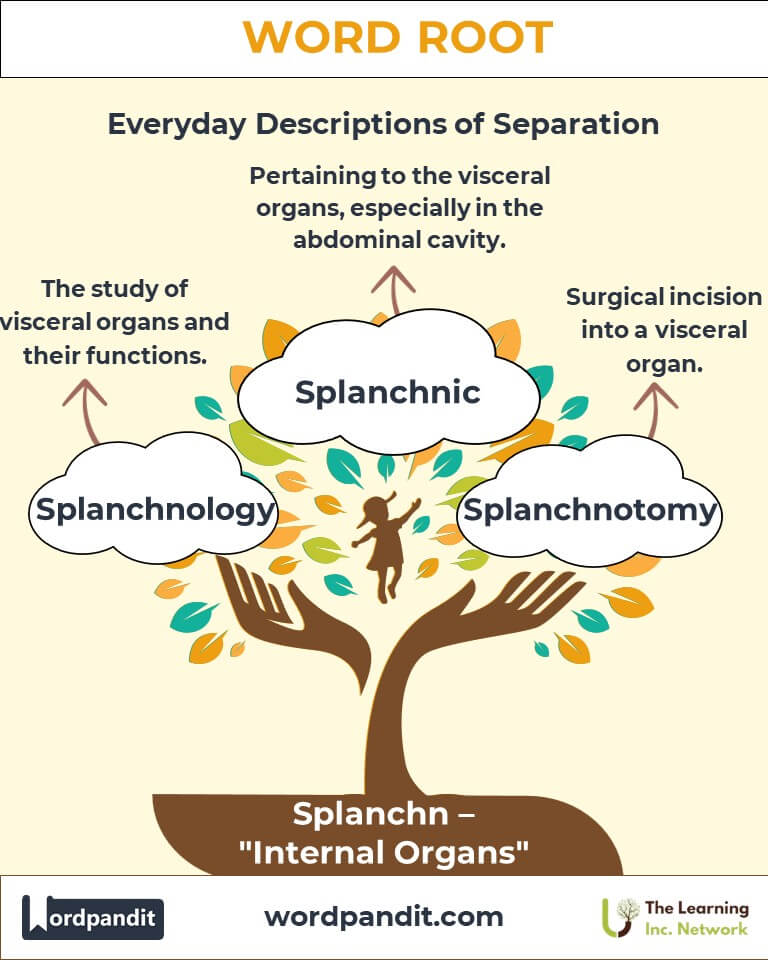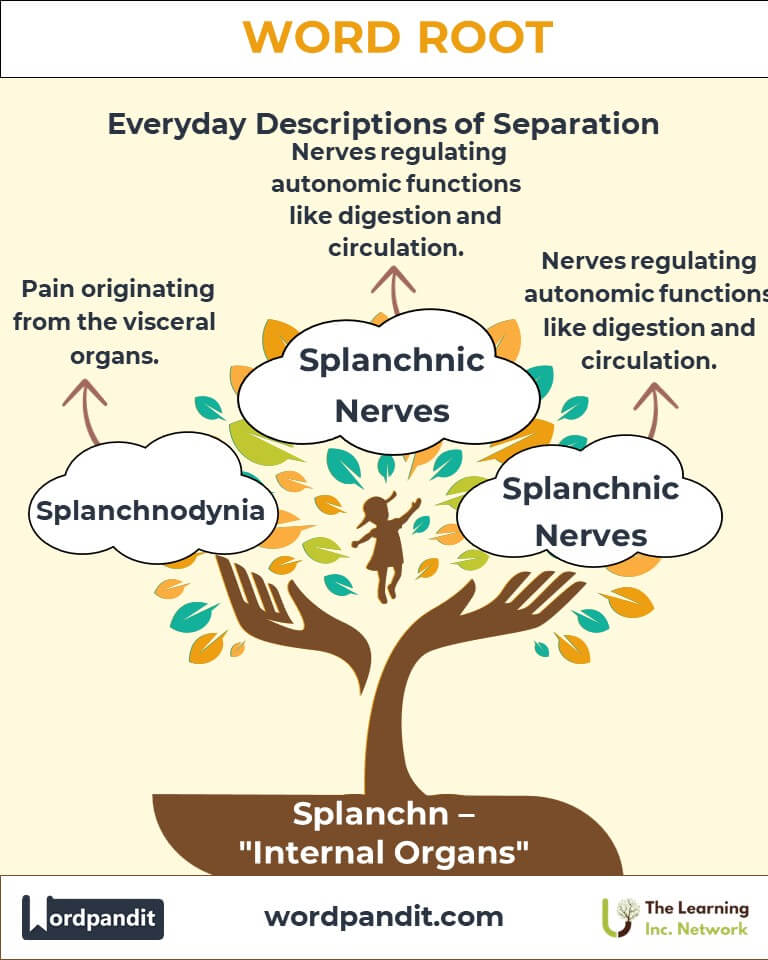Splanchn: Unveiling the Hidden Depths of Viscera in Science and Medicine
Discover the fascinating realm of the root "Splanchn," derived from the Greek word meaning "viscera" or internal organs. Found in terms like "splanchnic" and "splanchnology," this root has influenced anatomy, physiology, and specialized fields of medical science. Delve into the intricacies of this linguistic cornerstone and its enduring relevance across disciplines.

Table of Contents
- Introduction: The Essence of Splanchn
- Etymology and Historical Journey
- Mnemonic: Unlocking the Power of Splanchn
- Common Splanchn-Related Terms
- Splanchn Through Time
- Splanchn in Specialized Fields
- Illustrative Story: Splanchn in Action
- Cultural Significance of Splanchn
- The Splanchn Family Tree
- FAQs about the Splanchn Word Root
- Test Your Knowledge: Splanchn Mastery Quiz
- Conclusion: The Living Legacy of Splanchn
Introduction: The Essence of Splanchn
Imagine a world without the knowledge of what keeps our bodies functioning—the intricate network of organs within us. The root "Splanchn" (pronounced splaŋk-n) opens a linguistic window into the visceral depths of human anatomy. Originating from the Greek term splanchna (viscera), this root underpins words that delve into the study and function of internal organs, bridging the gap between ancient understanding and modern medical marvels.

Etymology and Historical Journey
The word "Splanchn" traces its origins to Ancient Greek splanchna, referring to the internal organs, particularly those in the abdominal cavity like the stomach, intestines, and liver. The term evolved as medical sciences grew, becoming a key part of specialized anatomical vocabulary. During the Renaissance, when classical texts were reinterpreted, the term found its place in scholarly works, further cementing its significance in medicine and anatomy.
Mnemonic: Unlocking the Power of Splanchn
To remember "Splanchn," imagine an X-ray revealing the intricate workings of the abdomen. Picture the word itself as a roadmap guiding us through the mysteries of the body.
Mnemonic Device: "Splanchn—your secret guide to the organs inside!"
Common Splanchn-Related Terms
- Splanchnic (splaŋk-nik):
- Definition: Pertaining to the visceral organs, especially in the abdominal cavity.
- Example: "The splanchnic nerves play a vital role in regulating digestive processes."
- Splanchnology (splaŋk-nol-uh-jee):
- Definition: The study of visceral organs and their functions.
- Example: "A course in splanchnology offers insight into the anatomy of the abdomen."
- Splanchnopleure (splaŋk-noh-ploor):
- Definition: A layer of embryonic tissue that forms part of the internal organs.
- Example: "The development of the splanchnopleure is crucial in early embryogenesis."
- Splanchnodynia (splaŋk-noh-din-ee-uh):
- Definition: Pain originating from the visceral organs.
- Example: "Splanchnodynia is often associated with conditions like irritable bowel syndrome."
- Splanchnotomy (splaŋk-not-uh-mee):
- Definition: Surgical incision into a visceral organ.
- Example: "Splanchnotomy is performed only in critical medical situations."
Splanchn Through Time
- Splanchnology in Early Anatomy: In ancient Greece, splanchnology focused on understanding organ functions through dissections. Over time, these observations shaped modern anatomical studies.
- Splanchnic Nerves in Physiology: The understanding of splanchnic nerves evolved from rudimentary knowledge to their central role in managing autonomic responses, such as digestion and circulation.
Splanchn in Specialized Fields
- Medicine:
- Splanchnology underpins gastroenterology and abdominal surgery.
- Example: "Understanding splanchnic blood flow is critical in managing liver diseases."
- Neuroscience:
- Studies of the splanchnic nerves reveal their role in autonomic functions like gut motility.
- Embryology:
- The splanchnopleure is studied for its role in forming the gastrointestinal tract during development.
Illustrative Story: Splanchn in Action
Dr. Elena Vasquez, a gastroenterologist, faced a challenging case involving a patient with chronic abdominal pain. By studying the patient's splanchnic blood flow and analyzing the interactions of visceral nerves, she discovered an underlying vascular issue. Her understanding of splanchnology not only resolved the patient’s symptoms but also highlighted the interconnectedness of organs and their blood supply.
Cultural Significance of Splanchn
In ancient cultures, the viscera were considered the seat of emotions and instincts. The Greeks believed that the liver, part of the splanchna, symbolized courage. Today, the root’s legacy lives on in idioms like “gut feeling,” connecting our inner organs to intuition and emotional insight.

The Splanchn Family Tree
- Viscer- (Latin: "internal organs"): Example: "Visceral: Deep, instinctive feelings."
- Enter- (Greek: "intestine"): Example: "Enterology: Study of the intestines."
- Hepat- (Greek: "liver"): Example: "Hepatitis: Inflammation of the liver."

FAQs About the "Splanchn" Root
Q: What does "Splanchn" mean?
A: Splanchn is a Greek root meaning "viscera," referring to the internal organs of the body, particularly those in the abdominal cavity, such as the stomach, intestines, and liver.
Q: What are splanchnic nerves, and what do they do?
A: Splanchnic nerves are a group of autonomic nerves that regulate the functions of visceral organs, controlling processes like digestion, blood flow, and secretion.
Q: What is splanchnology?
A: Splanchnology is the study of visceral organs, focusing on their structure, function, and disorders. It is especially relevant in gastroenterology and surgery.
Q: Why is "Splanchn" still relevant today?
A: The root "Splanchn" remains essential in medical terminology, describing splanchnic blood flow studied in critical care and splanchnology foundational for abdominal and pelvic surgeries.
Q: What does splanchnodynia mean?
A: Splanchnodynia refers to pain originating from the visceral organs, such as abdominal cramping linked to gastrointestinal disorders.
Q: What role does splanchnic blood flow play in health?
A: Splanchnic blood flow refers to the circulation of blood to the digestive organs, vital for nutrient absorption and maintaining digestive health.
Test Your Knowledge: Splanchn Mastery Quiz
1. What does "Splanchn" mean?
2. Which term describes the study of visceral organs?
3. What is splanchnodynia?
4. What is the splanchnopleure?
5. Which field focuses on splanchnic blood flow?
Conclusion: The Living Legacy of Splanchn
The root "Splanchn" opens a window into the complex and fascinating world of visceral anatomy. From its ancient origins to its modern applications in medicine and neuroscience, it highlights the intricate interplay of organs and systems that sustain life. By exploring "Splanchn," we uncover not just words, but a deeper appreciation of the human body’s inner workings.












